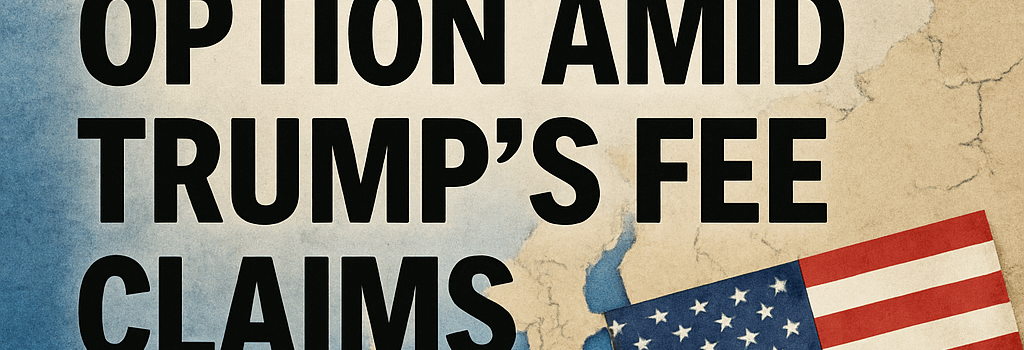EU Maintains ‘Fair Share’ Option Amid Trump’s Fee Claims

US President Donald Trump’s recent declaration that Europe has agreed not to impose network usage fees on Big Tech has sparked fresh controversy. While the White House fact sheet on the US-EU trade talks at Turnberry claims Brussels dropped the proposal, European Commission spokespeople insist any decision must clear the Digital Networks Act legislative process.
White House vs. European Commission Statements
- White House Fact Sheet: Declares the EU will “not adopt or maintain network usage fees” and reaffirms zero customs duties on electronic transmissions.
- EC Response: Spokesperson Thomas Regnier denies any binding commitment, underlining the sovereign right to legislate network cost contributions in upcoming EU law.
- Status of Trade Deal: Political agreement signed on July 27, 2025, remains non-binding until ratified by the European Parliament and Council under ordinary legislative procedure (OLP).
Background: The “Fair Share” Debate
European telecom operators, including BT, Deutsche Telekom, and Orange, have lobbied since 2022 for Big Tech to contribute to broadband construction and upgrades. Their argument centers on the exponential growth of streaming, cloud gaming, and AI inference traffic, which they say strains existing edge and backhaul networks.
“Online platforms now drive up to 70% of peak traffic, imposing maintenance and CAPEX burdens on ISPs,” said Maria Keller, CTO at Telecom Strategies International.
Technical Implications for Network Infrastructure
- Backhaul Capacity: ISPs are expanding from 100 Gbps to 400 Gbps links in metro rings to handle AI model downloads and 8K video streams, at costs exceeding €150,000 per node.
- Edge Compute: To reduce latency for AI inference and AR/VR applications, telcos are deploying micro-data centers at PoPs. Tech giants like Amazon Web Services and Google Cloud are already co-locating edge servers in several EU capitals.
- Interconnection Protocols: Future EU rules could standardize IP interconnection SLAs and pricing models, potentially mandating settlement-free peering only up to certain traffic thresholds.
Impact on Net Neutrality and Interconnection
Critics warn that introducing usage fees or differentiated interconnection terms could subvert net neutrality principles. The Biden administration’s 2023 submission to the WTO emphasized that such fees “could reinforce dominant operators, raise end-user costs, and create new chokepoints at the network edges.”
- Potential for traffic discrimination if smaller content providers cannot afford premium interconnect.
- Risk of increased latency for non-premium traffic, undermining competition in cloud gaming and video streaming.
- Regulatory complexity in enforcing fair-use thresholds and dispute resolution mechanisms.
Expert Opinions and Industry Reactions
Dean Bubley of Disruptive Analysis argues the Trump statement may reflect a tactical retreat by Brussels, using the US-EU deal to quash internal objections. “The EU’s AI ambitions and digital sovereignty goals run counter to burdening innovators with extra fees,” he wrote in a recent blog.
The Computer & Communications Industry Association (CCIA), representing Amazon, Google, Meta, and others, applauded the White House announcement but cautioned: “Details remain scarce on the scope, duration, and enforcement mechanisms of any commitment.”
Future Outlook: AI, 5G, and Edge Computing
As 5G Standalone rolls out across Europe in 2025–2026, traffic demands from IoT, autonomous vehicles, and industrial automation will surge. Telecom operators argue they need predictable revenue streams—potentially from network fees—to justify investments in slicing, multi-access edge computing (MEC), and carrier-grade cloud platforms.
Meanwhile, Big Tech is racing to deploy its own fiber, satellite constellations, and neutral-host small cells to bypass traditional ISPs.
Legislative Path Ahead
- EU Digital Networks Act: Trilogue negotiations will resume in Q4 2025. Any “fair share” clause must pass both the European Parliament and Council votes by mid-2026.
- US Policy Mirror: If Brussels imposes fees, US lawmakers may push the FCC to revisit Universal Service Fund contributions by online platforms.
- Global Trade Implications: The WTO’s digital trade discussions will monitor the EU-US outcome, potentially influencing Canada, Japan, and ASEAN policy stances.
Additional Analysis: Market Dynamics and Competitive Edge
Requiring usage fees could favor vertically integrated operators with cloud and CDN arms, such as Orange Cloud and Deutsche Telekom’s MagentaCLOUD. Smaller regional ISPs might struggle to negotiate interconnect deals, leading to consolidation and potential antitrust concerns.
Additional Analysis: Consumer Impact and Pricing Models
Distributed ledger pilots are exploring transparent settlement records between content providers and ISPs. Token-based credit systems could emerge to track megabyte-level exchanges, but they may add operational complexity and security considerations.
Note: We have requested updates from both the White House and European Commission and will publish new details as they emerge.